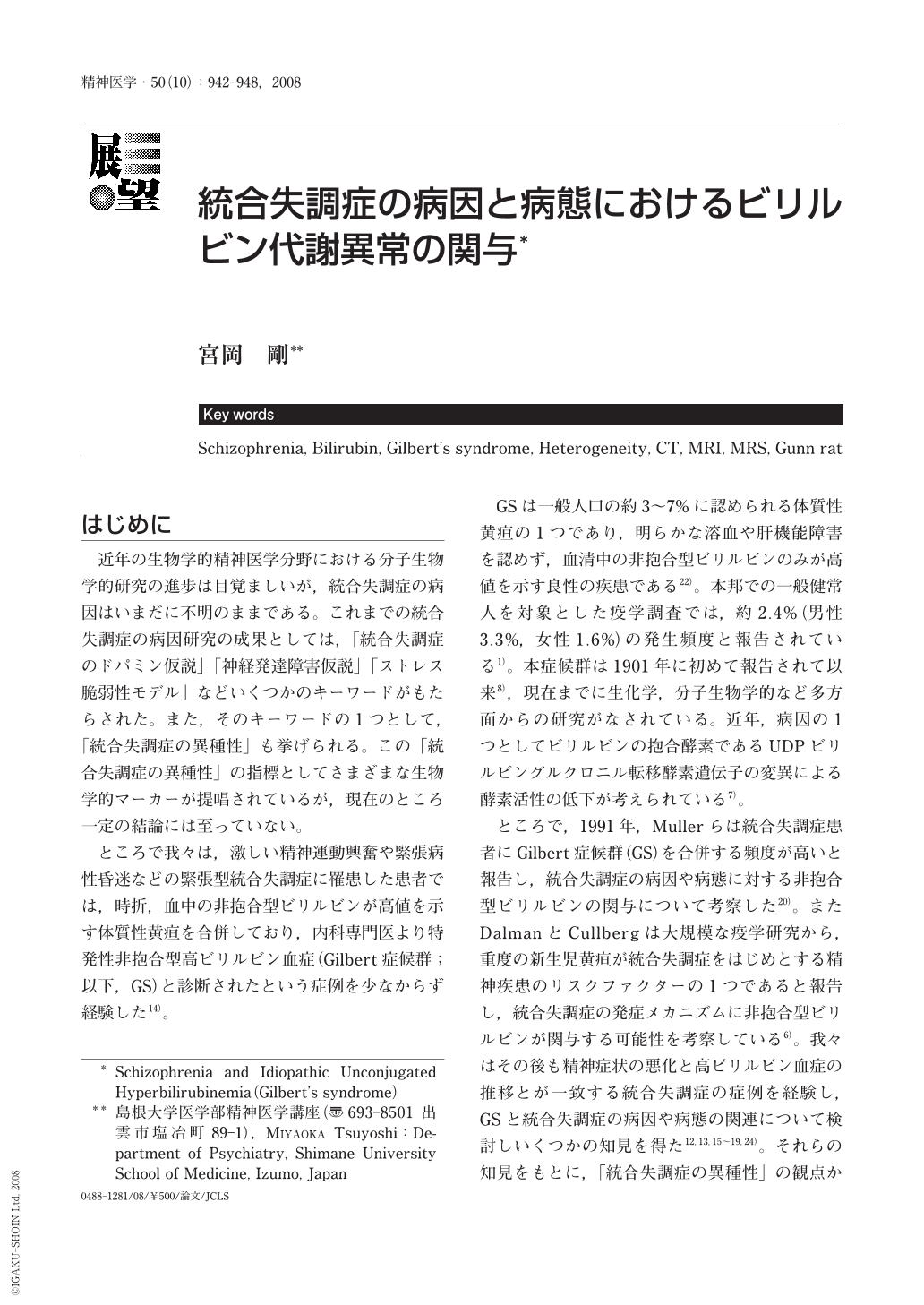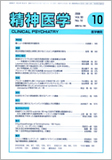Japanese
English
- 有料閲覧
- Abstract 文献概要
- 1ページ目 Look Inside
- 参考文献 Reference
- サイト内被引用 Cited by
はじめに
近年の生物学的精神医学分野における分子生物学的研究の進歩は目覚ましいが,統合失調症の病因はいまだに不明のままである。これまでの統合失調症の病因研究の成果としては,「統合失調症のドパミン仮説」「神経発達障害仮説」「ストレス脆弱性モデル」などいくつかのキーワードがもたらされた。また,そのキーワードの1つとして,「統合失調症の異種性」も挙げられる。この「統合失調症の異種性」の指標としてさまざまな生物学的マーカーが提唱されているが,現在のところ一定の結論には至っていない。
ところで我々は,激しい精神運動興奮や緊張病性昏迷などの緊張型統合失調症に罹患した患者では,時折,血中の非抱合型ビリルビンが高値を示す体質性黄疸を合併しており,内科専門医より特発性非抱合型高ビリルビン血症(Gilbert症候群;以下,GS)と診断されたという症例を少なからず経験した14)。
GSは一般人口の約3~7%に認められる体質性黄疸の1つであり,明らかな溶血や肝機能障害を認めず,血清中の非抱合型ビリルビンのみが高値を示す良性の疾患である22)。本邦での一般健常人を対象とした疫学調査では,約2.4%(男性3.3%,女性1.6%)の発生頻度と報告されている1)。本症候群は1901年に初めて報告されて以来8),現在までに生化学,分子生物学的など多方面からの研究がなされている。近年,病因の1つとしてビリルビンの抱合酵素であるUDPビリルビングルクロニル転移酵素遺伝子の変異による酵素活性の低下が考えられている7)。
ところで,1991年,Mullerらは統合失調症患者にGilbert症候群(GS)を合併する頻度が高いと報告し,統合失調症の病因や病態に対する非抱合型ビリルビンの関与について考察した20)。またDalmanとCullbergは大規模な疫学研究から,重度の新生児黄疸が統合失調症をはじめとする精神疾患のリスクファクターの1つであると報告し,統合失調症の発症メカニズムに非抱合型ビリルビンが関与する可能性を考察している6)。我々はその後も精神症状の悪化と高ビリルビン血症の推移とが一致する統合失調症の症例を経験し,GSと統合失調症の病因や病態の関連について検討しいくつかの知見を得た12,13,15~19,24)。それらの知見をもとに,「統合失調症の異種性」の観点から体質性黄疸であるGSを合併する統合失調症の特徴に関する考察を加えたい。
Idiopathic unconjugated hyperbilirubinemia (Gilbert's syndrome, GS) is a relatively common congenital hyperbilirubinemia occurring in 3-7% of the world's population. It has been recognized as a benign familial condition in which hyperbilirubinemia occurs in the absence of structural liver disease or hemolysis, and the plasma concentration of conjugated bilirubin is normal. Recently, it was reported that unconjugated bilirubin exhibited neurotoxicity in the developing nervous system. The ‘neurodevelopmental hypothesis' of schizophrenia proposes that an as yet unidentified event occurs in utero or during early postnatal life. We have observed that patients suffering from schizophrenia frequently present an increased unconjugated bilirubin plasma concentration when admitted to the hospital. Therefore, we noticed a relation between unconjugated bilirubin and the etiology of and vulnerability to schizophrenia. Our reported findings suggest that there are significant biological and clinical character differences between schizophrenic patients with and without GS. From the viewpoint of the heterogeneity of schizophrenia, there may be a poor outcome for the subtype of schizophrenia with GS.

Copyright © 2008, Igaku-Shoin Ltd. All rights reserved.


